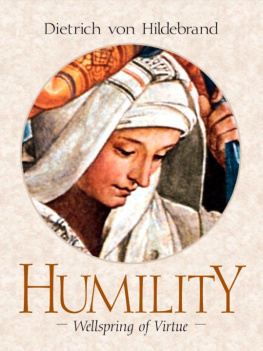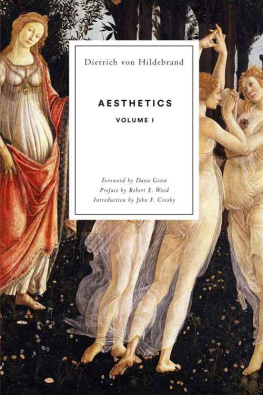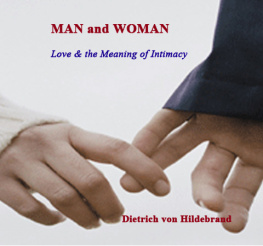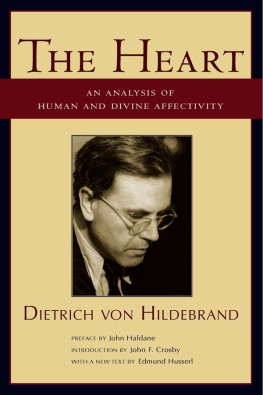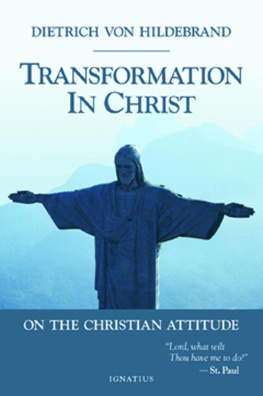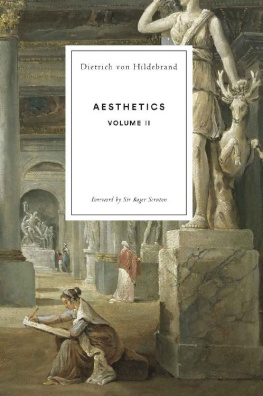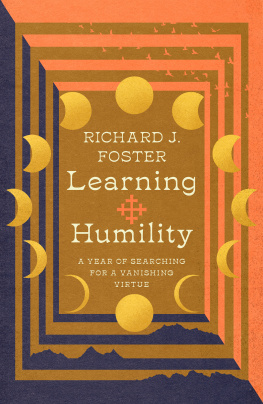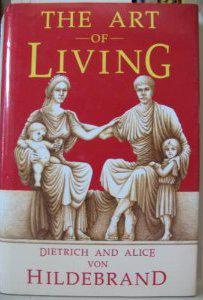Dietrich von Hildebrand - Humility: Wellspring of Virtue
Here you can read online Dietrich von Hildebrand - Humility: Wellspring of Virtue full text of the book (entire story) in english for free. Download pdf and epub, get meaning, cover and reviews about this ebook. year: 1997, publisher: Sophia Institute Press, genre: Science. Description of the work, (preface) as well as reviews are available. Best literature library LitArk.com created for fans of good reading and offers a wide selection of genres:
Romance novel
Science fiction
Adventure
Detective
Science
History
Home and family
Prose
Art
Politics
Computer
Non-fiction
Religion
Business
Children
Humor
Choose a favorite category and find really read worthwhile books. Enjoy immersion in the world of imagination, feel the emotions of the characters or learn something new for yourself, make an fascinating discovery.
- Book:Humility: Wellspring of Virtue
- Author:
- Publisher:Sophia Institute Press
- Genre:
- Year:1997
- Rating:4 / 5
- Favourites:Add to favourites
- Your mark:
- 80
- 1
- 2
- 3
- 4
- 5
Humility: Wellspring of Virtue: summary, description and annotation
We offer to read an annotation, description, summary or preface (depends on what the author of the book "Humility: Wellspring of Virtue" wrote himself). If you haven't found the necessary information about the book — write in the comments, we will try to find it.
Dietrich von Hildebrand: author's other books
Who wrote Humility: Wellspring of Virtue? Find out the surname, the name of the author of the book and a list of all author's works by series.
Humility: Wellspring of Virtue — read online for free the complete book (whole text) full work
Below is the text of the book, divided by pages. System saving the place of the last page read, allows you to conveniently read the book "Humility: Wellspring of Virtue" online for free, without having to search again every time where you left off. Put a bookmark, and you can go to the page where you finished reading at any time.
Font size:
Interval:
Bookmark:


Other books by Dietrich von Hildebrand
available from Sophia Institute Press:
Marriage: The Mystery of Faithful Love
The Art of Living
Confidence in God
The New Tower of Babel
Jaws of Death: Gate of Heaven
Trojan Horse in the City of God
Transformation in Christ
Liturgy and Personality
Man and Woman

by Dietrich von Hildebrand
................... 99
NOTE: The biblical quotations in these pages are based on the Douay-Rheims edition of the Old and New Testaments. Some quotations have been cross-referenced with the differing enumeration in the Revised Standard Version, using the following symbol: (RSV =).

Everyone that exalteth himself shall be humbled,- and he that humbleth himself shall be exalted. Luke 14:11

- is a divine virtue.
What is true of love - that without it, all other virtues and good works are valueless - is again, in another respect, true of humility. For, just as love embodies the life of all virtues and expresses the inmost substance of all holiness, humility is the precondition and basic presupposition for the genuineness, the beauty, and the truth of all virtue.
It is mater and caput ("mother" and "fountainhead") of all specifically human virtues; for, inversely, pride (superbia) is not only by itself our primal sin: it also inwardly contaminates all intrinsically good dispositions and robs every virtue of its value before God. A consideration of pride, therefore, will help us better understand the nature and importance of humility.
Pride is worse than concupiscence
The two are mostly intertwined in some definite manner. Persons tainted by pride alone are seldom to be met with. It is these two enemies that render us blind to value. But they are not of equal importance: it is not concupiscence but pride that constitutes the primal evil in our souls. Satan's original gesture is the act of absolute pride that rebels against God, the embodiment of all values, in an impotent attempt to appropriate His power and dominion.
True, in the sinfulness of many men (indeed, of most men) concupiscence plays a more conspicuous part; but, nevertheless, it falls short of being the primal evil. That is why in the Gospels even the sin of impurity, however grave, is less severely judged than that of pride. Christ denounced pride and obduracy in far more incisive terms than the sins of the flesh.
Thus, pride is the deepest root of the malignancy within ourselves, which is entirely consonant with the fact that Adam's sin, too, consisted in an act of disobedience inspired not by concupiscence, which was only to be a consequence of the Fall, but by pride.
Humility conquers pride
The fact alone that pride is the primal source of all moral evil clearly demonstrates the paramount importance of humility. What is most essential in the process of dying to ourselves is the conquest of pride and that liberation from one's self whose name is humility.
Pride has many forms
There exist formally and materially distinct forms of pride. As humility represents an antithesis to every form of pride, a consideration of the various forms and degrees of pride will help us become aware of the various aspects of humility, each of which expresses a negation of pride in one or another of its manifestations.
Satanic pride hates goodness
Let us begin this survey of the types of pride with the worst and most characteristic one, which we may call satanic pride. He who is afflicted with this knows one kind of satisfaction only: the glorification of his self. For him, the entire world is devoid of interest except insofar as it offers him an opportunity to experience his own superiority, power, and splendor. Subject to this spasm of the ego, enslaved to his exclusive interest in the excellence of his self as such, he is unable to grasp the inherent beauty and nobility of objective values.
Satanic pride blinds
He is, then, blind to value; but his kind of value-blindness is not that dull insensibility to values which marks the slave of concupiscence. On the contrary, he does in a sense grasp the metaphysical force that resides in value, the majestic sovereignty proper to it.
However, he grasps it in a way that implies, at the same time, its profound misconception. For - and herein precisely consists his valueblindness - while he is aware of that character of compelling sovereignty inherent in values, he fails to see its essential nexus with their selfcontained beauty, their objective significance independent of any utilitarian or decorative use in the service of an ego.
Hence, it happens that his value-blindness bears a tinge, not of dull indifference, but of hostility. Values, to him, are a scandal; he fatally endeavors to alienate their sovereignty and transfer it to his own self. He fears them as a menace to his supreme glory derived from his autonomous selfhood; the claim to submission which emanates from them he meets with resentment and rebellion. He does not, as does the concupiscent man, content himself with ignoring values and turning a deaf ear to their call. He would, as it were, dethrone them; again and again he performs the impotent gesture which is aimed at depriving them of their metaphysical power.
Frequently enough his endeavor takes the form of an attempt at enthroning some false value in the place of the true ones. In certain typical cases, it is this mechanism of disguised pride which underlies the cult of idols.
,5 He shuts his eyes to the goodness and holiness of God; he fails to perceive the indissoluble union between all-powerfulness and allgoodness; he would separate omnipotence from all-goodness and attribute the former to himself. All his thoughts are centered in the one overwhelming consciousness of "counting for much."
This yearning for self-supremacy is not satisfied by terrestrial power, by actual physical power as such; he also hungers for the possession of that metaphysical grandeur which is implicit in all possession of value.
Font size:
Interval:
Bookmark:
Similar books «Humility: Wellspring of Virtue»
Look at similar books to Humility: Wellspring of Virtue. We have selected literature similar in name and meaning in the hope of providing readers with more options to find new, interesting, not yet read works.
Discussion, reviews of the book Humility: Wellspring of Virtue and just readers' own opinions. Leave your comments, write what you think about the work, its meaning or the main characters. Specify what exactly you liked and what you didn't like, and why you think so.

